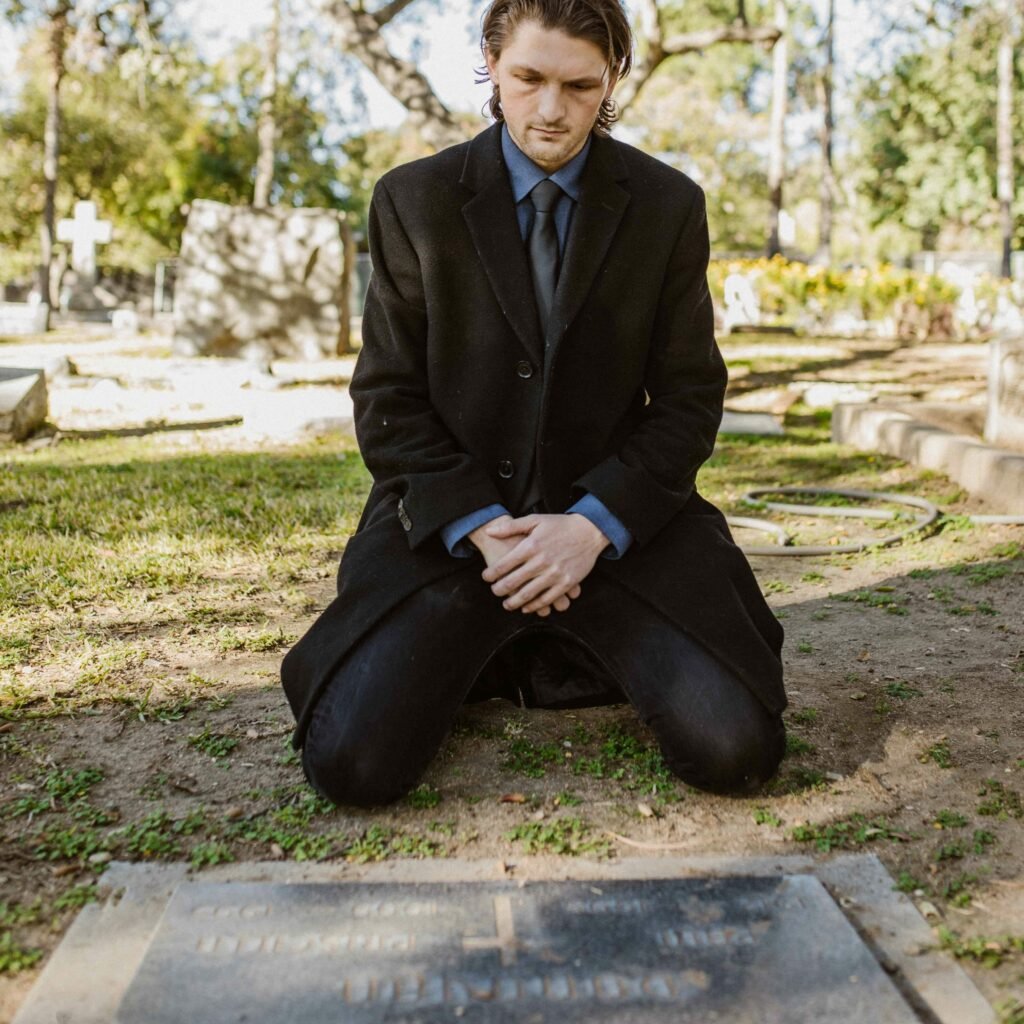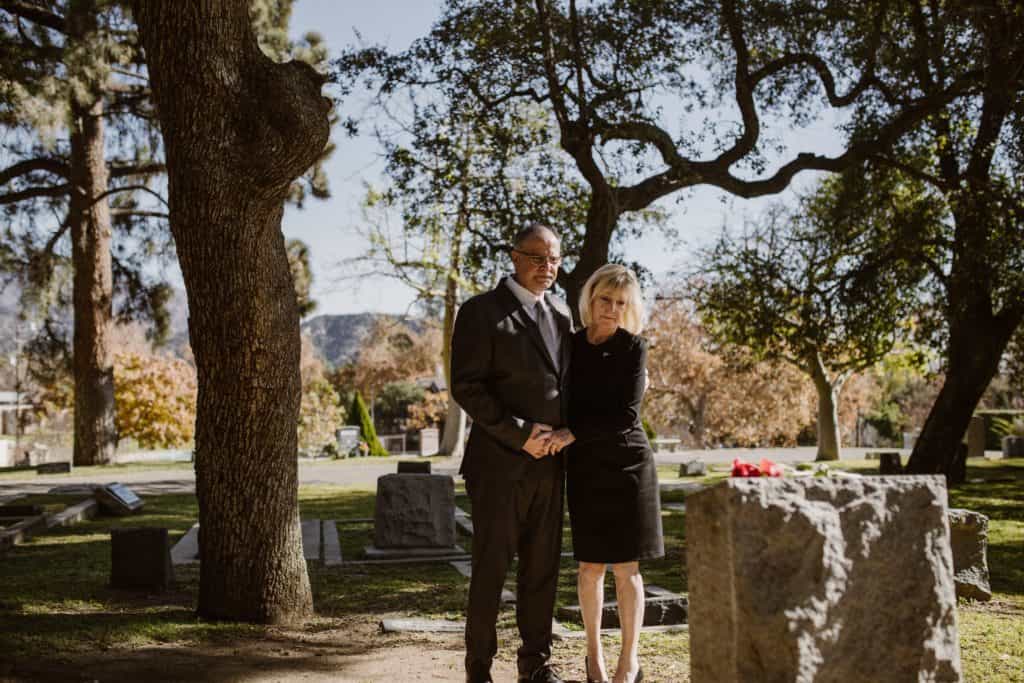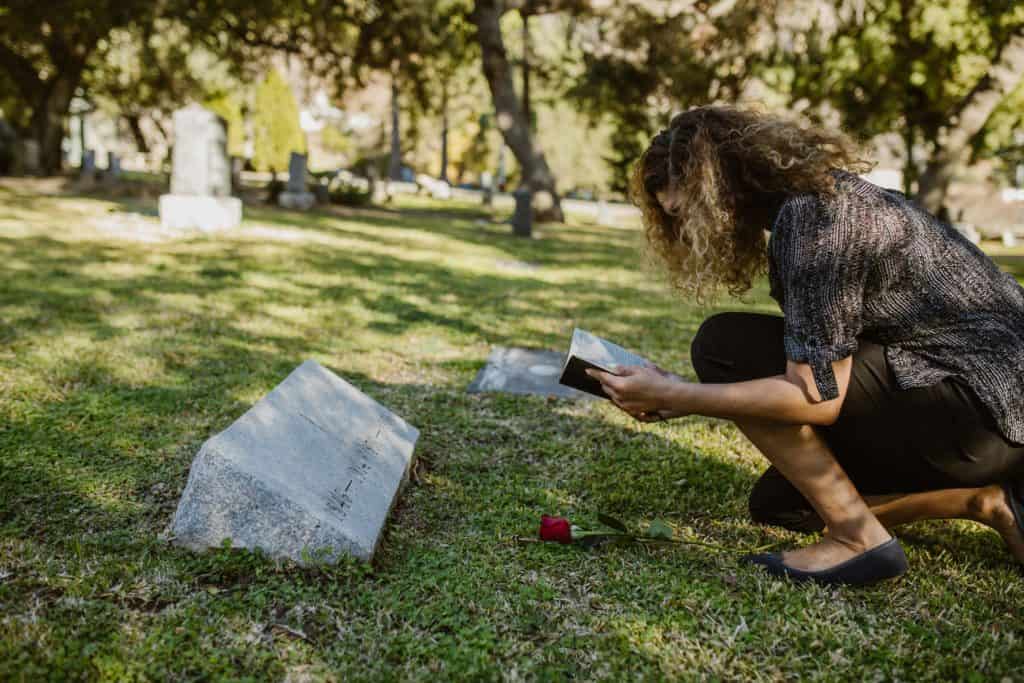There’s a particular kind of sadness that comes with looking at old photos. It’s a melancholy kind of nostalgia, the longing for something we once had but may never have again. And that feeling only intensifies if the person in the photo is no longer alive.
Whether it’s the photo of a grandparent, or a departed spouse, or a sibling or child that was taken too soon, one thing is for sure: We miss them deeply and feel like we’d give anything just to see them one more time.
We want to talk to them, regretting all the things we didn’t get to say. We want to hear their voice, tell them all that’s happened since they’ve been gone.
For some, it goes beyond just a feeling. They actively seek out answers, wondering if there’s some possible way they can reach out to those who have already died.
After all, haven’t we heard some say that those who’ve died might be watching the living? Or that our dead ancestors can pass on guidance and wisdom to help us in our lives?
By looking closely through scripture, we can find the answers to these deep and unsettling questions, clear up a few confusions, and gain a better understanding of God and His loving, merciful nature.
We’ll learn about:
- The unconscious state of those who have died
- Why the Bible talks about the “ghost” of Samuel
- The meaning of the parable of Lazarus and the rich man
- Why it’s a good thing we can’t speak with those who are dead
- The hope we still have—for ourselves, for those passed on, and those facing death
While it’s not exactly a fun topic to explore, it’s often best done when we dive right in and get through it. So here we go.

Those who died are resting, unconscious, until Jesus resurrects them—they do not live, think, or speak
Death being an unconscious, sleep-like state is supported throughout the Bible. Instead of becoming part of a new reality or dimension, those who die become unconscious while God’s Breath of Life, which makes our bodies become a human being (Genesis 2:7), returns to God.
And if we search the Bible for guidance on the practice of attempting to speak with the dead, it’s not hard to find out that God absolutely forbids it.
He specifically speaks against the practice of mediums, necromancy, and any other type of spiritualism, even going so far as to command the death of those who practice it (Leviticus 19:31, 20:6, 20:27, Deuteronomy 18:10-12, Revelation 21:8).
He does this because that practice is not possible—and it could cause something else entirely.
But if God loves us and understands our sorrow and grief, why would He forbid us speaking to those we’ve lost?
We can actually find comfort in God’s wisdom in that He allows those who have died to rest undisturbed by thoughts, feelings, or the passage of time in the world they no longer can be a part of.
King Solomon, perhaps one of the wisest men who ever lived, remembered this fact and counselled people to make good use of their time on earth.
“Whatever your hand finds to do, do it with all your might, for in the realm of the dead, where you are going, there is neither working nor planning nor knowledge nor wisdom” (Ecclesiastes 9:10 NIV).

The author of Job knew the same thing: once someone dies, that’s the end for them until Jesus comes again. Until His return, nothing is going to disturb their rest.
“But a person dies and fades away; he breathes his last—where is he? As water disappears from a lake and a river becomes parched and dry, so people lie down never to rise again. They will not wake up until the heavens are no more; they will not stir from their sleep” (Job 14:10-12, CSB, emphasis added).
“As a cloud disappears and vanishes away, so he who goes down to the grave does not come up. He shall never return to his house, nor shall his place know him anymore” (Job 7:9-10, NKJV).
Once someone dies, they have no means of communication. They cannot contact the living, either by speaking to them or by reappearing in places and homes they once loved. And no human being has the power to “call” them.
There can be no hauntings, no departed loved ones appearing to us in our time of need. It just isn’t possible.
This is likely the reason God is so vehement against the practices of spiritualism and contact with the dead. He knows the dead can’t speak back and doesn’t want His children to be tricked or misled.
He doesn’t want them taken advantage of by those who could use their time of grief to get money or attention.
He also doesn’t want his children to open themselves up to dangerous influences, verly likely by control of Satan, masquerading as the faces of loved ones. This is a very real and legitimate danger, as our next story shows.

What about Samuel’s ghost?
With what we know the BIble says about the state of the dead, it can seem strange to read the story of King Saul seeking a medium to summon the spirit of Samuel, a wise prophet who had since died.
Samuel was one of the last judges of Israel. During his many years of service, God gave him the task of appointing Israel’s first king, which turned out to be Saul.
During his first few years as king, Saul followed God faithfully, obeying His commands and often turning to Samuel for wisdom and guidance. But, as Saul’s power grew, he became jealous and prideful, disregarding God’s commands and rejecting Samuel’s counsel. Eventually it got so bad that Samuel refused to be his counselor any more, leaving king Saul to his own devices.
Time went on and, eventually, Samuel died and was buried. All Israel mourned for him.
Some time after, Saul got himself mixed up in combat against the Philistines, Israel’s sworn enemies. His army was in a bad place and he didn’t know what to do. His armies were outnumbered and since he had been ignoring God for so long, he didn’t think He would answer him.
He wished he had Samuel’s wisdom to guide him, just as he had in the old days. But Samuel was dead. What was he going to do?
Saul made up his mind and, with a couple of soldiers, set out in the middle of the night to a place called Endor in search of a medium, someone who claimed to speak with the dead. During his early years as king, under God’s directions, Saul had set out to destroy such practitioners and drive them out of Israel. But now, in his hour of desperation, he went to one for help.

Disguised, he went to visit the woman. She was reluctant at first, reminding him that such spiritualism and contact with the dead was outlawed.
And Saul swore to her by the Lord, saying, “As the Lord lives, no punishment shall come upon you for this thing.”
Then the woman said, “Whom shall I bring up for you?”
And he said, “Bring up Samuel for me.”
When the woman saw Samuel, she cried out with a loud voice. And the woman spoke to Saul, saying, “Why have you deceived me? For you are Saul!”
And the king said to her, “Do not be afraid. What did you see?”
And the woman said to Saul, “I saw a spirit ascending out of the earth.”
So he said to her, “What is his form?”
And she said, “An old man is coming up, and he is covered with a mantle.” And Saul perceived that it was Samuel, and he stooped with his face to the ground and bowed down.
Now Samuel said to Saul, “Why have you disturbed me by bringing me up?”
And Saul answered, “I am deeply distressed; for the Philistines make war against me, and God has departed from me and does not answer me anymore, neither by prophets nor by dreams. Therefore I have called you, that you may reveal to me what I should do.”
Then Samuel said: “So why do you ask me, seeing the Lord has departed from you and has become your enemy? And the Lord has done for Himself as He spoke by me. For the Lord has torn the kingdom out of your hand and given it to your neighbor, David. Because you did not obey the voice of the Lord nor execute His fierce wrath upon Amalek, therefore the Lord has done this thing to you this day.
Moreover the Lord will also deliver Israel with you into the hand of the Philistines. And tomorrow you and your sons will be with me. The Lord will also deliver the army of Israel into the hand of the Philistines” (1 Samuel 28:10-19, NKJV).
Saul returned to his camp that night, utterly demoralized. The next morning, Israel rode into battle against the Philistines, and everything that “Samuel’s ghost” had predicted came to pass.
Now, on the surface, this story seems contradictory to the prevalent language concerning the state of the dead, and the ability to communicate with them.
Not only was the ghost of Samuel conscious and able to be contacted, but he apparently had some foreknowledge about how the next day’s battle would end.

So what’s going on here? Why was Samuel’s” ghost” able to speak?
Well, because it wasn’t Samuel’s ghost. Look at the details.
Why was Saul unable to see this ghost, and why, if this really was the dead spirit of Samuel, did he allow Saul to bow low and act like a worshipper before him? God is the only one the king ought to bow to, and Samuel definitely knew this.
All these details, along with the fact that this entire scenario flies in the face of God’s teachings about death, leads us to infer that this wasn’t the ghost of Samuel at all, but one of Satan’s agents. Remember, when Satan was kicked out of Heaven, he brought a third of the angels with him. They became his servants and soldiers, working for him towards the destruction of humanity.
That was this fallen angel’s plan. Hit Saul when he’s at his weakest, overwhelmed and afraid. Make him believe he’s talking to an old and trusted mentor, then strike him down with the worst news possible, since Satan knew that God was not protecting Saul at this point.
Saul returns to his army with no courage or heart left to fight, and the wicked angel’s prediction becomes a sort of self-fulfilling prophecy.
This is part of the reason God warns us against trying to speak with the dead. Not just because it isn’t possible, but because by trying to contact them, we may potentially be opening ourselves up for a much darker sort of influence. One of Satan’s favorite forms of attack is deception, and he’ll use any tricks he can to get the better of us.
The first lie Satan ever told humanity was in the garden of Eden where he tricked Eve into taking the forbidden fruit. He told her “You will not surely die” (Genesis 3:4, ESV). He called God a liar, and through Adam and Eve’s actions, they believed him, and humanity has paid the price ever sense.
God gave us clear teaching about death and the afterlife so that we won’t be deceived. He wants to safeguard us from Satan and his deceit. The Bible forbids contact with the dead, not because God is a cold-hearted tyrant who doesn’t want us to see our dead loved ones, but because he wants to protect us, to shield us from the Devil’s lies. It’s just a part of God being the loving father He is.

What about the rich man and Lazarus?
By looking through the details of Saul’s story, we can understand that the being who appeared to him was not Samuel’s ghost, but one of Satan’s agents. It would be second nature to such a being as the Devil, to try and trick people, misleading them about the ability to reach the dead.
But what do we do when seemingly contradictory answers come from a trustworthy source? What do we do when something God said about death in one part of the Bible doesn’t seem to match what he said in another part?
That’s also the situation we seem to have in the book of Luke, where Jesus tells quite the fantastical story.
Jesus was giving a sermon to the people and had just finished rebuking the Pharisees, who were lovers of money, because they were skilled at making themselves look holy in front of others, despite the fact that God knew how evil their hearts were.
He immediately followed with a parable.
There was a certain man who was very rich. He had chariots and horses, the best food to eat and the best clothes to wear. At the gates of this rich man’s city sat a beggar named Lazarus, who had little money and was covered in sores. He sat at the rich man’s gate every day, begging for leftover scraps, but the rich man never so much as looked at him.
“The poor man died and was carried by the angels to Abraham’s side. The rich man also died and was buried, and in Hades, being in torment, he lifted up his eyes and saw Abraham far off and Lazarus at his side.
So he called to him, ‘Father Abraham, have mercy on me, and send Lazarus to dip the end of his finger in water and cool my tongue, for I am in anguish in this flame.’
“But Abraham replied, ‘Child, remember that you in your lifetime you received your good things, and Lazarus in like manner bad things; but now he is comforted here, and you are in anguish. And besides all this, between us and you a great chasm has been fixed, in order that those who would pass from here to you may bot be able, and none may cross from there to us.’
And he said, ‘Then I beg you, father, to send Lazarus to my father’s house—for I have five brothers—so that he may warn them, lest they will not also come into this place of torment.’
But Abraham said, ‘They have Moses and the Prophets; let them listen to them.’
And he said, ‘No, father Abraham, but if someone from the dead goes to them, they will repent.’
He said to him, ‘If they do not listen to Moses and the Prophets, they will not be convinced even if someone rises from the dead’” (Luke 16:22-31, ESV).

On the surface, this story seems to talk about an immediate afterlife, and the ability for the dead to communicate with the living.
Perhaps, by taking the story piece by piece, we can figure out what Jesus was trying to say.
First of all, we need to remember that this was one of Jesus’ parables, a fictional story he made up to make a point. Everyone in the crowd was familiar with this method of His.
Secondly, when Jesus talked about the rich man ending up in Hell, he used the word Hades, which wasn’t a Hebrew word at all. It was a word they’d learned from the Greeks which referred to a realm of the underworld where the dead roamed about as aimless spirits. The Jews had their own word for where the dead went after they died, Sheol which simply meant “the grave,” and had no connotation of the spirits of the dead walking around.
Jesus was using the non-Biblical concept of a conscious afterlife to make a point to his audience. That’s why the dead in this story are able to do things like talk to one another and communicate with the living. Clearly, Jesus was using symbolic language to illustrate a point.
None of it was meant to be taken literally. Just imagine a heaven where all the dead are clustered around Abraham while they watch the wicked being tormented. It just wouldn’t work.
So, if all this symbolic language was laid out so Jesus could make a point, what point was he trying to make?
When we first meet the rich man, he is described as wearing the best clothes and having the best food. He was wealthy, and in Hebrew culture, wealth and prosperity were often mistakenly viewed as blessings from God—evidence that this person was righteous and that God was pleased with them.

On the other hand, poverty, sickness, and disease, such as Lazarus had, were viewed as curses, signs that God was displeased with someone. When the Pharisees and the rest of the audience heard Jesus begin his story, they already “knew” how it was going to end. The rich man was going to die happy and blessed by God, and the poor man Lazarus was going to be taught a cautionary lesson.
But in the second half of the story, Jesus turns the entire situation on its head. Lazarus is brought up to Heaven where he receives bliss and comfort, while the rich man is left down in Hell without even enough water to cool his tongue. While he was alive, he had the opportunity to share his good things, to follow the teachings God gave through Moses and take care of the poor and needy around him. But he refused. Now he has nothing to give, not even a warning to his family so they’ll make better choices than he did.
Jesus sums up this story well when he said to the Pharisees, “You are the ones who justify yourselves in the sight of others, but God knows your hearts. For what is highly admired by people is revolting in God’s sight” (Luke 16:15, CSB).
The Pharisees put a great deal of value in their wealth and status as Abraham’s children, but Jesus knew their hearts, and the way they treated those around them was detestable in his sight.
What’s more, this was to illustrate the importance of how we act and treat others in the present. Because once people have chosen against God, despite being given chances to repent and change, not even a person risen from the dead will change their minds.
Jesus had a very important lesson in his parable about the rich man and Lazarus, but it wasn’t a lesson about the dead. There is no contradiction between what Jesus taught about death and what the rest of Scripture says.

Why is it good that the dead cannot speak?
Suppose what would happen if God didn’t have such strict boundaries regarding what happens to people after they die. Suppose that, out of feeling sorry for humanity, He allowed those who died to have limited contact with people who were still alive.
Some of us might say this would be a great improvement, that it might offer many grief-stricken people the comfort and closure they crave.
This idea is also romanticized in stories, often showing dead loved ones subtly guiding the ones they left behind, or showing up at important moments to provide a hint of inspiration or hope.
But let’s think about this for a moment.
If the dead were conscious, be it in Heaven or Hell, and were able to look down and watch the world, what do you think they would see?
They might see their children grow up. They might watch over their spouse and make sure they’re doing alright. But they’d also have to watch all the grief and suffering that came with their death. They’d have to witness the giant hole their absence left in those who loved them. They’d be forced to watch in silence unless someone among the living decided to try and contact them.
Would you want to spend eternity like that, waiting around like a shadow in the corner until someone happened to notice you? It would be miserable. And it probably wouldn’t be all that comfortable for the living either.
They’d be perpetually aware of this undefinable presence floating around them, just out of reach. They would feel as if they were being constantly watched and they wouldn’t know what to do about it.
And even supposing they did know what to do, if they somehow made contact with the dead person watching over them at every single moment, who’s to say it would be a pleasant conversation? It might be extremely unsettling.
When it’s all said and done, we have no guarantees that the ability to contact the dead would be as pleasant or comforting as we sometimes imagine it to be. God knew what He was doing when He made it so the dead are put to rest rather than entering a wandering, conscious state. In a way, it’s more comforting to think of those we love in a peaceful, restful sleep where they can wait until Jesus comes again.

What hope does the Bible offer for those who have died?
God has given us a lot through His inspired word. He’s given us the explanation of how death works and what it’s like so that we don’t have to be afraid to face it when our time comes.
He’s given us warnings against Satan and his deceivers so we won’t be tricked and led down the wrong path.
God’s also given us hope, a way to look past death and know it isn’t the end of everything. He’s given us a promise that, one day, He will return and set everything right again, even death itself.
“But we do not want you to be uninformed, brothers and sisters, about those who are asleep, so that you will not grieve as indeed the rest of mankind do, who have no hope. For if we believe that Jesus died and rose from the dead, so also God will bring with Him those who have fallen asleep through Jesus.
For we say this to you by the word of the Lord, that we who are alive and remain until the coming of the Lord, will not precede those who have fallen asleep.
For the Lord himself will descend from heaven with a shout, with the voice of an archangel and with the trumpet of God, and the dead in Christ will rise first. Then we who are alive, who remain, will be caught up together with them in the clouds to meet the Lord in the air, and so we will always be with the Lord. Therefore comfort one another with these words” (1 Thessalonians 4:13-18).
God doesn’t want us to be deceived, to go off looking for hope in the wrong places. He doesn’t want us to waste our lives trying to reach out to those we’ve lost.
So often, we get dragged down with our own grief and wish there was some way for us to bring the ones we love back to us, to speak to them and see their faces. But perhaps, rather than calling to our dead loved ones and trying to drag them back into this sinful, damaged world, we should let them rest in God’s care, knowing He loves them and will bring them back again when He returns.
Losing someone hurts. That’s the sad truth. But through that pain, we have to remember God loves that person too, even more than we do. He’s looked after them, given them a peaceful place where they can rest and wait, free from sin and sorrow.
